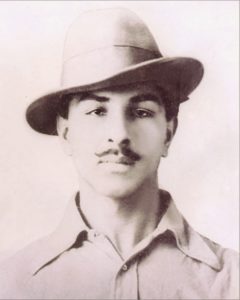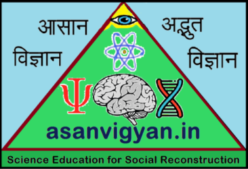
Bhagat Singh – The Iron Willed
Ever heard of Bhagat Singh?
The one mentioned in our history books.
And shown in flicks as a young kingpin,
Waging war on Imperial crooks?
Do you then see him as a young brave man?
With mustache, coat; with hat and boots?
Was his life just a flash in the pan?
Of a fearless fighter, ready to shoot?
Movies did made a point to show,
He lived without fear like an extremist.
There’s more of him, would you like to know ?
From the jail notes; that he’s a rationalist?
His pop-persona does deserve a bow!
But still there’s a lot, quite unknown.
When his sands of time were running low
That’s when his ideas had really shone!
He read and formed strong ethical views
As a humanist and a socialist.
His views on god, let me give you a clue,
He penned, “Why I am an atheist!”
A lunatic free even in jail,
Wrote notes that spurred a revolution,
Withstood the test of time to prevail,
And invigorate us for generations.
Spare some time to read his words!
Wherein his inner-life appears!
His weapon as a pen; not a sword!
And bombs? Just for the deaf to hear!
May his views be spread and heard,
Felt deep by heart, understood by mind.
For life and death will be well served;
Inqlaab to free our humankind!
Free from hunger, free from greed;
From blinding hate and apathy!
Free from hollow words and deeds;
From old and new chicaneries!
Let him roar in our souls,
“Inqlaab will never be killed!”
Glory to the Legacy of
Bhagat Singh, the Iron-willed!
Inqlaab Zindabaad !
We all are familiar with the most beloved freedom fighter of India, Bhagat Singh. The brave heart, martyr; an extremist. There were 5 bollywood movies on his life, romanticizing him and portraying him as the ideal son of the soil. The first two Shaheed-E-Azad (1954) and Shaheed (1965), did well in the cinemas. The next 3, Shaheed-e-Azam: Bhagat Singh, The Legend of Bhagat Singh and 1931: Shaheed, oddly released in the same year, 2002, fared just enough to recover the production costs. Maybe the millennials do not have much of an attachment towards the freedom fighters as their grandparents had? Or maybe any typical biopic on Bhagat Singh so far has been like a disconnected highlight reel without a backbone; jumping from scenes of him protesting, motivating fellowmen, teaming up with other fighters, gunning down a police, throw bombs at the parliament, scenes where he’d debate with the judge, the hunger strike, emotional drama between mother and son, and finally his hanging. His charismatic side of personality does deserve admiration. But what about his contemplative side ? His views on Casteism ? God ? Capitalism ? Anarchy ? Will the real Bhagat Singh hurt religious or class based sentiments ?
Hoping for a brave movie someday, as brave and authentic as the man himself; a movie that would educate and elucidate rather than run on popular emotions and ‘idiot-box office’ agendas. The nationalistic jingoism associated in these movies are sad to see and seems to go dead against Bhagat Singh’s reality. Wondering if the directors, producers, and actors have ever actually read the best reference available to write about his story, his own jail notes. Towards the later part of his life, he had noted down gems of ideas, collections from various revolutionary books he had read, treasured in his Jail notebook. (Bhagat Singh seemingly had penned 4 books during his stay in jail but sadly only a short synopsis of his writings have survived.) To quote him:
“Any man who stands for progress has to criticize, disbelieve and challenge every item of the old faith. Item by item he has to reason out every nook and corner of the prevailing faith. If after considerable reasoning one is led to believe in any theory or philosophy, his faith is welcomed. His reasoning can be mistaken, wrong, misled and sometimes fallacious. But he is liable to correction because reason is the guiding star of his life. But mere faith and blind faith is dangerous: it dulls the brain, and makes a man reactionary.”
Deep beneath our revolutionary hero resided an avid reader, thinker, rationalist and a great visionary that never got enough ‘air-time’ among the general population. Let’s not fall into the trap of labeling him an ‘Indian’ or something like that. He sought and fought for not just a transfer of power form white to brown people, but rather a transformation in society aligned to better human values. If he were alive today, he’d be more of a world citizen and an empathetic anarchist, who would have created a dream world of his own. As given in the assembly leaflet,
“We dream of a glorious future, when man will be enjoying perfect peace and full liberty. But, the sacrifice of few individuals at the altar of the great revolution that will bring freedom to all, rendering the exploitation of man by man impossible, is inevitable.”
It’s this aspect of Bhagat Singh; his detachment from an ego-based stance, and total acceptance of his actions as a sacrifice for a greater cause of ending exploitation of man by man, and outright rejection of all sugar-coated mystical pursuits of god or afterlife, arguably, formed the backbone of his Iron will. Especially relevant to us today, his dream and goals deserve deep introspection and implementation from within. To go deeper into what he meant by revolution,
” We must make it clear that revolution does not mean an upheaval. Revolution necessarily implies the programme of systematic reconstruction of society on a new and better adopted basis, often necessitating complete destruction of the existing state of affairs. It was one of the illusions of each generation that the social institutions in which it lived were natural and permanent. Yet for countless years social institutions had been superseded by other adopted to temporary needs.”
It’s quite clear he meant Inqlaab as not just one act of bravery, but a systematic approach to bring in the changes in the existing setup, keeping in view of the end goal of greater well being for all. If there are systems that prevent us from doing so, then they need to be uprooted mercilessly. And this process of reconstruction and demolition would naturally start from the individual, and slowly gather momentum over time, marching towards common goal of freedom. On behalf of a generation inspired by his Inqlaab, this post is just a small salute to our favorite hero, our role-model & inspiration behind this website; who still is well alive in the form of consolidated ideas and highest of ideals.
![]()
Some video links, references, readings and writings:
- Delhi University’s Associate Professor (History), Dr. Anirudh Deshpande’s article “Recalling Bhagat Singh : Atheist, Internationalist and Marxist” gives a lucid insight into the core of Bhagat Singh’s ideologies in context of his life. As he sums up, “Bhagat Singh had a number of political choices before him but the fact that he consciously abjured them in favor of a fiery independence, atheism and internationalism is worthy of introspection, if not emulation.”
- “Why I am an Atheist” Bhagat Singh: Epified in this vivid illustration of his ideology and rationale behind him being an atheist when accused by his friend of being puffed up by vanity (Hindi: मैं नास्तिक क्यों हूँ and English: Why I am an Atheist)
- “Would Bhagat Singh like modern India ?” A nice collection of his quotes in context of modern times, raising concerns about the misinterpreted ideas and ideals about Bhagat Singh.
- From one of the most inspiring online newspapers in India, “5 Immortal Ideas Of Sardar Bhagat Singh That Continue To Live And Inspire The Nation”, Nalin Rai, Better India, March 24, 2015.
